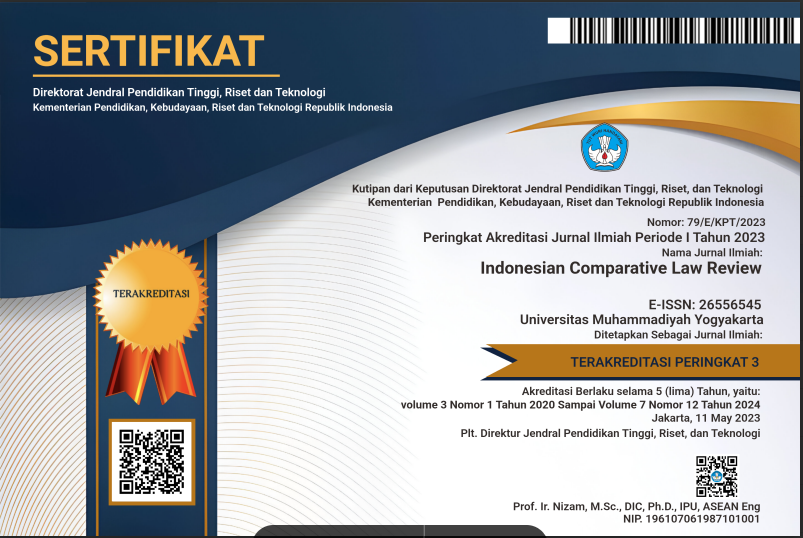The Laws in Medical Futility: A Comparative Study between the Malaysian, English, American, Indonesian, and Islamic Law
Abstract
Keywords
Full Text:
PDFReferences
A Hospital v. SW, EWHC 425 (Fai) (2007).
Airedale NHS Trust v Bland [1993] 1 All ER 821.
Al-Mughni, Volume. 9
Al-Sharh-ul-Kabeer, lilDurdeer, Volume 4
Anna Nowarska (2011). To Feed or Not to Feed? Clinical Aspects of Withholding and Withdrawing Food and Fluids at the End of Life, lo Advances in Palliative Med. 3, 4.
Alias, F., Muhammad, M.; Kassim, P. (2015). The legality of euthanasia from the Malaysian and islamic perspectives: An overview. Medicine and Law, 34(3), 509-532.
Baily, M. (2011). Futility, autonomy, and cost in end-of-life care. Journal of Law, Medicine Ethics, 39(2), 172-182.
Biggs, H., 2001. Euthanasia, Death with Dignity and the Law. Oxford: Hart Publishing: De Cruz, P. 2005. Nutshells on Medical Law. London: Sweet & Maxwell. at pp. 216-217.
Choong, K.; Chandia, M. (2013). Technology at the end of life: Medical futility and the muslim pvs patient. International Review of Law, 2013(2), 1-15.
Council Ethical Judicial Affairs, Am. Med. Assn., Medical Futility in End-of-life Care: Report of the Council on Ethical and Judicial Affairs, 281 JAMA 937, 938 (1999).
Decision of Health Minister, number 812 year 2007, of "Regulations of Palliative Care" and Number 37 of 2014
D.L. Scheidermayer. "The Decision to Forego CPR in the Elderly Patient,"JAMA, 260 (1988): 2096-97, B. Zawacki, "Tongue-tied in the Burn Intensive Care Unit," Critical Care Medicine, 17 (1988): 198-99
D.W. Brock, S.A. Wartman, "When Competent Patients Make Irrational Choices." New Engl J Med 1990; 3zz: 1595-1599.
Giles R. Scofield, "Is Consent Useful When Resuscitation Isn't?." Hastings Center Report, 21 (1991): 28-36.
Hudson v. Tex. Children's Hosp., 177 S.W.3d 232, 233
Judith F. Daar, 'A Clash at the Bedside: Patient Autonomy v. A Physician's Professional Conscience," Hastings Law Journal,44 (1993): 1241-89
Maureen Kwiecinski, To Be or Not to Be, Should Doctors Decide? Ethical and Legal Aspects of Medical Futility Policies, 7 Marq. Elder's Advisor 313, 342-47 (2006) (arguing that the Act violates the procedural safeguards of the Due Process Clause in the Fourteenth Amendment)
Miles, S. H. (1992). Medical futility Law, Medicine and Health Care, 20(4), 310-315.
Nihat-ul-Muhtaj, Volume. 7
Pope, T. (2007). Medical futility statutes: No safe harbor to unilaterally refuse life-sustaining treatment. Tennessee Law Review, 75(1), 1-82.
President's Commission for the Study of Ethical Problems in Medicine and Biomedical and Behavioral Research, Deciding to Forego Life-Sustaining Treatment (Washington, D.C.: U.S. Government Printing Office, 1983)
Puteri Nemie Jahn Kassim; Omipidan Bashiru Adeniyi, "Withdrawing and Withholding Medical Treatment: A Comparative Study between the Malaysian, English and Islamic Law," Medicine and Law 29, no. 3 (2010): 443-462
Re G [2002] (Adult Incompetent: Withdrawal of Treatment), 65 BMLR 6.
Robert L. Fine & Thomas Wm. Mayo, Resolution of Futility by Due Process: Early Experience with the
Texas Advance Directives Act, 138 Annals Internal Med. 743, 743 (May 6, 2003).
Saeed al-Harbi, Figh a-muwazonah wo hajot a-Imam wo a-khatib lahu. Retrieved from http://uqu.edu.sa/files2/tiny-mce/plugins/filemanager/files/4230042/feqh-almowaznah.pdf
Spielman, B. (1994). Collective decisions about medical futility. Journal of Law, Medicine and Ethics, 22(2), 152-160.
Troyen A. Brennan, "Physicians and Futile Care: Using Ethics Committees to Slow the Momentum," Law, Medicine & Health Care, 20 (1992): 336-39.
Truog. R. D. (2009). Medical futility. Georgia State University Law Review, 25(4), 985-1002.
Yusuf Qaradawi, Figh a-muwazonah Retrieved from http://www.qaradawi.net/library/66/3269.htm.
Zerwas, J. (2007). Medical futility in texas: Handling reverse right-to-die obstacles without constitutional violation. Tulsa Law Review, 43(1), 169-198.
DOI: https://doi.org/10.18196/iclr.2221
Refbacks
- There are currently no refbacks.
Copyright (c) 2020 Syaheera Aina Baharudin

This work is licensed under a Creative Commons Attribution 4.0 International License. View My Stats


